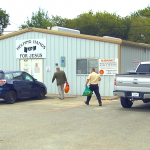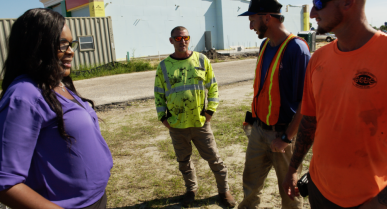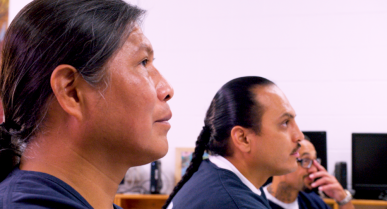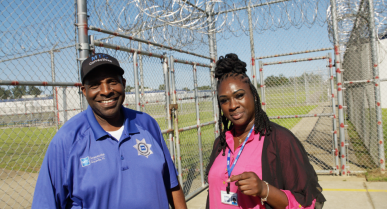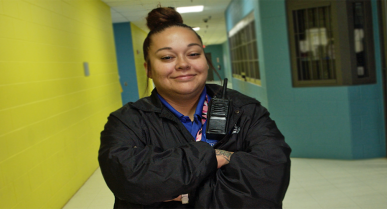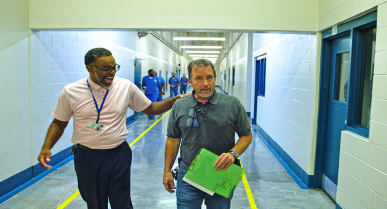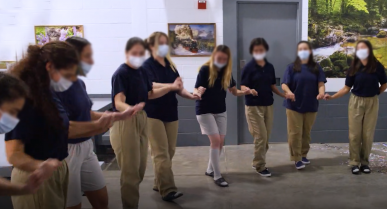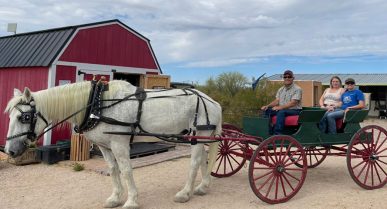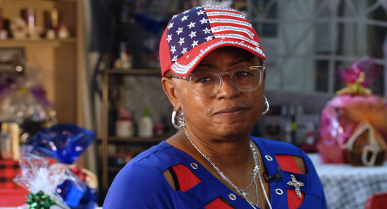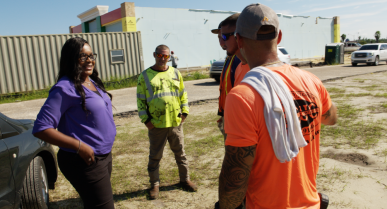A Garden at the Sanders Estes Unit Grows More than Just Vegetables
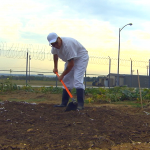 “Well, the garden project started with a couple employees, mainly Mr. Van Looy (finance manager),” explains Deputy Warden Terry Wiktorik of the Sanders Estes Unit, a correctional facility located in Venus, Texas and operated by MTC.
“Well, the garden project started with a couple employees, mainly Mr. Van Looy (finance manager),” explains Deputy Warden Terry Wiktorik of the Sanders Estes Unit, a correctional facility located in Venus, Texas and operated by MTC.
Terry went on to describe Steve Van Looy’s proposal. “He said ‘why are we having to throw away slop and all this paper when we can make compost?’ And I told him, I said compost out of paper and kitchen material? And he said ‘yes’, so we said go play…go, go try it and we’ll see, as we’re shaking our heads in disbelief. And then about six weeks later he came and he got me and Warden [Robert] Treon. And we went and we looked and I said that’s not compost, that’s a pile of dirt.”
Out of that pile of dirt grew a garden project that is the envy of any avid gardener. It’s hard to believe there was nothing but hard, clay-like soil on this previously idle property—now covered with beautiful flowers and vegetables.
“I’m not a farmer,” says Van Looy. “I have no idea how to grow stuff. It was a crazy idea that….what if?”
Staff with some know-how were recruited to oversee the project, along with offenders eager to learn and hone their cultivating skills, leading to what is now a beautiful, productive garden spot.
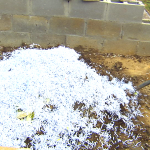 The garden project begins with the compost cooking process, managed by bins and organized by their various states of decomposition. The finished, ripened product is used to enrich the garden soil. It’s also used as material for potting plant seedlings to be used as ‘starts’ in the garden.
The garden project begins with the compost cooking process, managed by bins and organized by their various states of decomposition. The finished, ripened product is used to enrich the garden soil. It’s also used as material for potting plant seedlings to be used as ‘starts’ in the garden.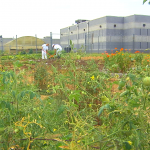
But making compost is just the beginning of this garden project’s self-sustaining nature. Mr. Van Looy explains.
“In the compost bins, we have to maintain a certain level of moisture, so we’ll water it. Compost tea, is a nutrient-rich water that seeps through the compost, picking up some of those vitamins and nutrients from the decomposing food and paper. And it looks like tea, that’s why it’s called tea. We collect that in a 55-gallon drum that they buried underground, and we’ll pump that out into a small pail and water the garden crops with that nutrient-rich compost tea, which, again, is a recoverable resource that normally would just go to waste.”
‘Recoverable resources’ is what the Sanders Estes Garden project is all about. Not only in making compost and its tea, but in harvesting seeds and preparing them for future plantings in the restored green house which had been nothing but a storage shed for years. And the use of recoverable resources doesn’t stop there.
“Gardens need water,” says Mr. Van Looy. “So we installed some water tanks, basically. We collect rain water from the roof, and air conditioning condensate. We’ve yet to have to use any water from our municipal water supply.”
To top off the renewable nature of the Sanders Estes garden project, the crops harvested are donated to a local food bank, providing fresh vegetables to families in need.
Linda Russell volunteers at the food bank operated by nearby Helping Hands for Jesus.
“The canned goods we get is great,” she says. “Don’t get me wrong, it’s great, but to get something fresh that does not have all these preservatives in it, knowing that they’re going to get great food and great vegetables from MTC, it’s a big impact. We have people that have cried and hugged [us] because they got fresh fruits and vegetables. They’re very appreciative of everything MTC has done for them.”
Inmate garden worker Joey Parnell speaks to his and his fellow inmates’ enthusiasm.
“Everybody, my co-workers, when we come out here in the morning, we look forward it. Everybody grabs a bucket or grabs a hoe, does whatever they got to do. And I think everybody just loves doing it.”
Bradly Gehrer, another inmate worker, adds his own perspective.
“Out there in the world I’ve taken from the community. And now I’m able to give back.”
“I can relate to people that are struggling out there,” says Mr. Parnell, “that don’t have a lot of things that they need, so it makes me feel good inside that somebody’s able to sit down and eat something that we planted and we grew out here.”
Mr. Van Looy expresses his astonishment at what has happened to the garden project. “It’s been amazing to see so many different people, from so many different backgrounds come together to support this project and make it work. Just the fact that it grew from nothing to almost 3,000 pounds that we’re going to donate to the local food bank; knowing that we’re going to make a difference in someone’s life, it makes me feel good and gives all of us a sense of pride that something we’re doing is really making a difference.”
“I know it warms my heart,” says Deputy Warden Wiktorik, “which is pretty hard to do.”
Mr. Gehrer describes how his involvement has affected him.
“It makes me feel good in my heart. That I’m able to just give back, instead of taking from people. I can make somebody smile.”
